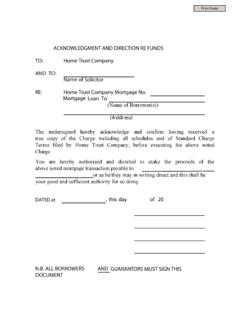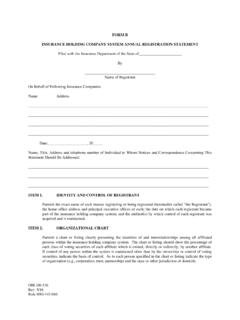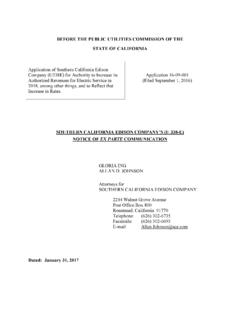Transcription of IN THE COURT OF CHANCERY OF THE STATE OF DELAWARE …
1 Revised cover page April 27, 2015. IN THE COURT OF CHANCERY OF THE STATE OF DELAWARE . KATHRYN MENNEN, SARAH ). MENNEN, ALEXANDRA MENNEN, ). SHAWN MENNEN, and JOHN ). MENNEN, ). ). Plaintiffs, ). ) No. 8432 ML. v. ). ). WILMINGTON trust COMPANY, a ). DELAWARE corporation, GEORGE JEFF ). MENNEN, and OWEN J. ROBERTS, not ). individually but solely as the individual ). trustee of the trust ESTABLISHED BY ). GEORGE S. MENNEN FOR THE ). BENEFIT OF GEORGE JEFF MENNEN ). u/a/d/ 11/25/1970, a DELAWARE trust , ). ). Defendants. MASTER S REPORT. (Post-Trial). Draft Report: December 8, 2014. Exceptions Submitted: February 13, 2015. Final Report: April 24, 2015. Kevin G. Abrams, Esquire, J. Peter Shindel, Jr., Esquire and Matthew L. Miller, Esquire of ABRAMS & BAYLISS LLP, Wilmington, DELAWARE ; OF COUNSEL: Herbert J. Stern, Esquire, Kevin M. Kilcullen, Esquire and Brian J.
2 DeBoer, Esquire of STERN &. KILCULLEN LLC, Florham Park, New Jersey; Attorneys for Plaintiffs. Jeffrey S. Cianciulli, Esquire of WEIR & PARTNERS LLP, Wilmington, DELAWARE ; OF. COUNSEL: Ralph T. LePore, III, Esquire, Benjamin M. McGovern, Esquire, Robert M. Shaw, Esquire and Amanda O. Amendola, Esquire of HOLLAND & KNIGHT LLP, Boston, Massachusetts; Attorneys for George Jeff Mennen LEGROW, Master The beneficiaries of a once substantial trust filed this action challenging twenty years of investment decisions by the individual and corporate trustees of the trust . It is undisputed that the trust , once valued at over $100 million, was reduced to a value closer to $25 million through a series of debt and equity investments largely focused on two insolvent, unproven, and ultimately unsuccessful private companies with no established record of profitability. There can be no doubt that the investments were astonishing failures.
3 The question is whether, divorced of hind-sight bias regarding the outcome of the challenged transactions, the trustees investment decisions expose them to liability to the beneficiaries. Because the trust agreement modified the trustees default duties and exculpated the trustees from liability unless they acted in bad faith or with willful misconduct, a showing that the trustees committed a lesser breach of trust will not result in the judgment the beneficiaries seek. What remains before the COURT after a settlement between the beneficiaries and the corporate trustee is whether the individual trustee, who is the beneficiaries brother and uncle, respectively, and who personally directed and oversaw the challenged investments, engaged in non-exculpated breaches of trust . I conclude that he did as to the vast majority of the transactions at issue. Interestingly, the bulk of the transactions tainted by the trustee s bad faith were not as one might expect directly intended to confer an immediate pecuniary benefit on the trustee.
4 Although a handful of investments directly relieved the trustee from personal guarantees or loans he made to these companies, or . on one notable occasion were used as leverage to ensure a company paid the trustee s consulting fees, most of the transactions were motivated by something far more 1. amorphous, but much more pervasive: pride. That is, because most of the trustee s personal fortune was out-of-reach in his own trust , the trustee turned to his brother s trust as a piggy bank he readily opened to fund a few private companies in which the trustee had invested his time and on which he had staked a claim that he was uniquely skilled at selecting and advising small fledgling companies that he could turn into the next big thing. Certain that fortune and acclaim were around the bend, the trustee eschewed the interests of the beneficiaries in favor of subsidizing his self-aggrandized standing as a financier.
5 It is perhaps unsurprising that, with his financial security assured by his own independently-managed trust , the trustee set out to achieve recognition within the business community and display the financial acumen that his ancestors exhibited when they built a substantial fortune with the admirable success of their own private company. The trustee breached the trust reposed in him, however, when he used the trust assets to achieve those goals. Although these motivations differ from the typical pecuniary incentives that traditionally underlie disloyal behavior, they are no less real and no less emblematic of bad faith. In fact, they bear all the hallmarks of more traditional disloyal behavior, except that, instead of investing his own money, the trustee invested his time and his name in the companies at issue, and then used the trust s money to protect and advance those investments.
6 Because this disloyalty is not exculpated by the trust agreement, the trustee is liable to the beneficiaries for the losses the trust suffered. 2. BACKGROUND. These are the facts as I find them after trial. A. The Mennen Family and the Mennen Company The plaintiffs, Kathryn Mennen ( Katie ), 1 Sarah Mennen ( Sarah ), Alexandra Mennen ( Alexandra ), Shawn Mennen ( Shawn ) and John H. Mennen ( John ). (collectively, the Plaintiffs or the Beneficiaries ), are the current beneficiaries of a trust established by George S. Mennen for the benefit of John H. Mennen and his issue by agreement dated November 25, 1970 (the trust ). Katie, Sarah, Alexandra, and Shawn are John s four children and range in age from 24 (Shawn) to 19 (Alexandra). 2 Katie, Sarah, and Alexandra are college students. Shawn has special needs and lives at home with John. John serves as Shawn s legal John is one of four children of George S.
7 Mennen (the Settlor ). The Settlor, who died on May 5, 2005, had three other children: William G. Mennen ( Bill ), Elma Christina Mennen ( Christina ), and defendant George Jeff Mennen ( Jeff ). Bill and Jeff are the children of the Settlor s first marriage and John and Christina are the children of the Settlor s second marriage. As set forth below, the trust and several others established by the Settlor at various times initially was funded with stock of The Mennen Company, a privately held 1. I use the Mennen family members first names for the sake of clarity. No disrespect is intended. 2. At the time this action was filed, Alexandra was a minor and initially was represented in the litigation by her mother. See Verified Compl. 7. Alexandra turned 18 on August 21, 2013. Joint Pre-Trial Stipulation and Order (hereinafter Pre-Trial Order ) 6. 3. Pre-Trial Order 6-7.
8 3. company founded in 1878 and located in New Jersey. The Mennen Company was perhaps best known for its Speed Stick and other personal hygiene products. The Settlor controlled approximately 30 percent of The Mennen Company at the time the trust was B. The trust On November 25, 1970, the Settlor established four irrevocable trusts, one for the benefit of each of his four children. Each trust was funded with approximately 18,700. shares of non-voting Class A common stock of The Mennen Company, and each trust later received 500 shares of The Mennen Company preferred stock. 5 The trust agreements named Lowell Wallace, a friend of the Settlor and an officer of The Mennen Company, as individual trustee of each trust and named defendant Wilmington trust Company ( Wilmington trust ) as corporate trustee. 6 Wilmington trust served as corporate trustee of the trust until it resigned on May 28, After Wallace left his employ at The Mennen Company, the Settlor appointed Jeff as the successor individual trustee of the Jeff also served in the same capacity for Christina s trust .
9 Jeff, a graduate of Washington & Lee University and the American Institute of Foreign Trade, was employed by The Mennen Company from 1968 until 4. Mennen v. Wilmington trust Co., No. 8432-ML (Feb. 12, 2014 & Feb. 14, 2014) (TRIAL. TRANSCRIPT) (hereinafter Tr. ) at 115 (Jeff). 5. Pre-Trial Order 12. 6. Id. 14-15. 7. Id. 15. Wilmington trust also served as corporate trustee of Jeff s trust until it resigned on the same date. Wilmington trust continues to serve as corporate trustee for the trusts established for Bill and Christina. Id. 8. Id. 14. 4. 1990, rising in the ranks from salesman to After he left The Mennen Company, Jeff ran a consulting business through which he offered consulting services to family-owned When the Settlor appointed Jeff as individual trustee of the trust , he was aware that Jeff had no background in At the time the trust was created, the family did not expect to sell The Mennen Company.
10 12 In March 1992, however, The Mennen Company was sold to Colgate- Palmolive Company for a combination of common stock and cash. 13 As a result of that sale, the trust received 830, shares of Colgate common stock, along with $8,318, in The agreement governing the trust (the trust Agreement ) identifies both John and his issue as current beneficiaries of the trust and envisions that the trust would last for several generations and serve the needs of John, his children, and his Article Second of the trust Agreement enumerates the trustees powers. In addition to the standard powers to retain, sell, dispose of, purchase, and invest and reinvest trust assets, the trustees are permitted to invest and reinvest funds held in the trust without any duty to diversify those The trust Agreement also gives the trustees the power to invest trust assets in businesses regardless of whether the Trustees acting in an individual capacity[] are or may be an officer, director, shareholder, partner or otherwise 9.





